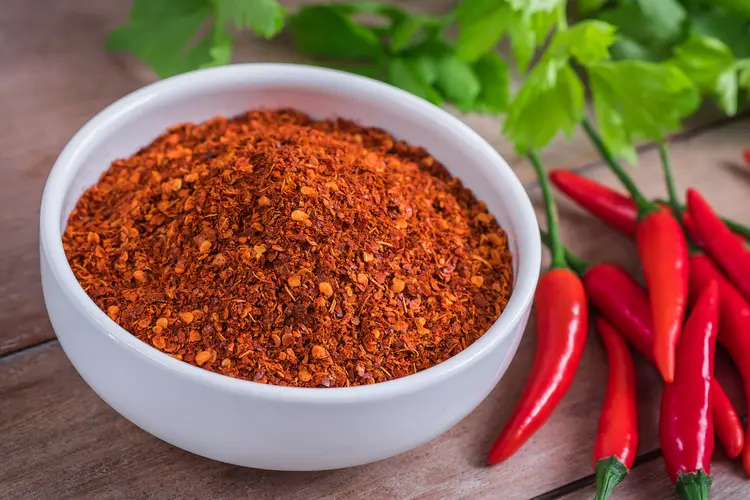- 0086-571-85302990
- sales@greenskybio.com
Cayenne Pepper: History, Health Benefits and Uses
2025-07-30

Cayenne pepper, a vibrant red spice originating from Central and South America, has captured attention not only for its culinary uses but also for its extensive medicinal properties. Introduced to Europe in the 15th century by Christopher Columbus, this fiery pepper quickly spread across the globe, becoming a staple in traditional medicine, particularly within Ayurvedic and Traditional Chinese Medicine practices.
Packed with bioactive compounds, cayenne pepper offers a range of health benefits, including pain relief, improved digestion, enhanced cardiovascular health, weight management, and boosted immunity.
Historical and Global Impact
Cayenne pepper has been cultivated for thousands of years, initially by indigenous peoples in the Americas who valued its ability to add spice to food and its use as a medicinal herb. Upon its introduction to Europe, it rapidly gained popularity, owing to its versatility and potent effects. Named after the city of Cayenne in French Guiana, the pepper is now grown widely, especially in India, Mexico, Africa, and the United States.
Traditional medicine systems have long utilized cayenne pepper to address digestive issues, enhance circulation, and alleviate pain.
Bioactive Compounds and Their Benefits
Cayenne pepper contains several notable phytonutrients:
- Capsaicin: Known for its heat, capsaicin possesses anti-inflammatory, pain-relieving, and metabolism-boosting properties.
- Vitamin C: A powerful antioxidant that supports both immune function and skin health.
- Vitamin A: Important for vision, immune system health, and cell growth.
- Flavonoids: Antioxidants that protect against oxidative stress and inflammation.
- Carotenoids: Pigments that promote eye health and lower the risk of chronic diseases.
These compounds collaborate to deliver cayenne pepper’s remarkable health benefits.
Health Benefits
Extensive research has demonstrated cayenne pepper’s potential to prevent and alleviate various conditions:
- Pain Relief: Capsaicin is often included in topical creams for arthritis, muscle pain, and nerve discomfort, working by depleting substance P, a neurotransmitter responsible for transmitting pain signals.
- Digestive Health: Contrary to popular belief, cayenne pepper can soothe the digestive system, stimulate the production of enzymes, reduce gas, and help prevent stomach ulcers.
- Cardiovascular Support: By improving circulation, lowering blood pressure, and reducing cholesterol, cayenne pepper promotes heart health.
- Weight Management: Capsaicin aids in boosting metabolism and suppressing appetite, supporting weight loss.
- Immune Boost: The spice’s high vitamin C content reinforces the immune system, aiding the body in fending off infections.
Culinary and Medicinal Uses
Recognized by names such as Guinea spice, cow-horn pepper, and bird pepper, cayenne pepper is a versatile ingredient used to add heat and depth to various dishes, including soups, stews, sauces, and marinades.
Beyond its culinary contributions, cayenne pepper is employed in detox regimens believed to cleanse the body and improve circulation. Anecdotal evidence suggests mixing cayenne pepper with warm water and lemon on a daily basis to enhance metabolism and overall wellness.
In the 19th century, the herbalist Samuel Thomson popularized cayenne pepper as a cure-all in the United States, advocating its ability to stimulate the body's healing processes. Although some of Thomson's claims have since been debunked, cayenne pepper remains a widely respected natural remedy.
Cayenne pepper embodies more than just a spice—it is a superfood with a rich heritage and a multitude of health benefits. Whether used to spice up a meal or as a natural treatment for pain and inflammation, cayenne pepper has earned its spot in both the kitchen and the medicine cabinet. For those seeking to incorporate more superfoods into their diet, cayenne pepper offers a flavorful and practical choice.
- ▶ Hesperidin
- ▶ Citrus Bioflavonoids
- ▶ Plant Extract
- ▶ lycopene
- ▶ Diosmin
- ▶ Grape seed extract
- ▶ Sea buckthorn Juice Powder
- ▶ Fruit Juice Powder
- ▶ Hops Extract
- ▶ Artichoke Extract
- ▶ Mushroom extract
- ▶ Astaxanthin
- ▶ Green Tea Extract
- ▶ Curcumin
- ▶ Horse Chestnut Extract
- ▶ Other Product
- ▶ Boswellia Serrata Extract
- ▶ Resveratrol
- ▶ Marigold Extract
- ▶ Grape Leaf Extract
- ▶ New Product
- ▶ Aminolevulinic acid
- ▶ Cranberry Extract
- ▶ Red Yeast Rice
- ▶ Red Wine Extract
-
Kidney Bean Extract
2025-07-30
-
Medicinal Marshmallow Extract
2025-07-30
-
Phellodendron Extract
2025-07-30
-
Calendula Extract
2025-07-30
-
Phyllanthus Emblica Extract
2025-07-30
-
Avocado Extract Powder
2025-07-30
-
Motherwort Extract
2025-07-30
-
Sea buckthorn Juice Powder
2025-07-30
-
Reishi mushroom extract
2025-07-30
-
Licorice Root Extract Powder
2025-07-30





















